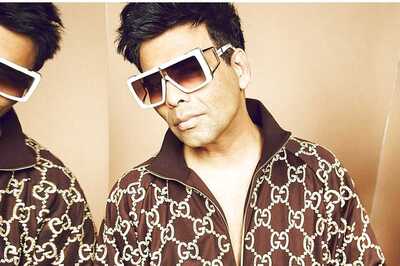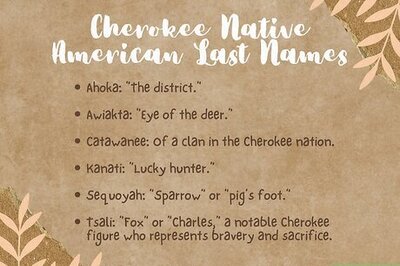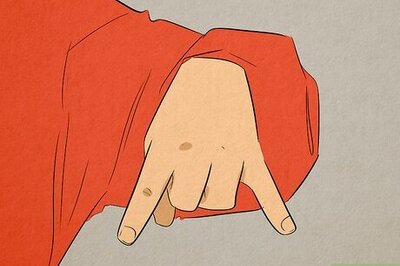
views
I was in Islamabad, speaking to him ahead of a visit by our Foreign Minister Pranab Mukherjee, and it struck me as a sad statement indeed. In the press, we get blamed for a hell of a lot- but are we to blame for impeding the progress of bilateral ties between the two countries?
The easy answer would be, no. India and Pakistan have had enough problems, enough wars and enough differences to have rotten relations completely on their own. But it is true that it is very difficult for them to conduct official ties without more than a fair share of media interest putting a harsh spotlight on them.
Take the trip to Islamabad this weekend for example- a total of 32 journalists traveled from New Delhi to cover what was a fairly low-expectation event, the delivery of SAARC invitations to the Pakistani leadership, and bilateral talks. That's about the same number that covered the Prime Minister's visit to Cebu for the ASEAN summit- and I can safely hazard the Foreign Minister won more column space and airtime than the PM did over the weekend.
And while it may be hard being a diplomat in the middle of the media frenzy, let me tell you being the journalist covering it is far more difficult.
To begin with- there is time pressure, every new piece of information will be picked up by your rival channel or paper in less than 8 ½ minutes (approximate time based on thoroughly faulty guesswork), so you have to take the information, double source it, write it up and get it to your editors and on your medium in that time.
And that's not so easy- you can be sure that nearly everything you get from an Indian official will not be corroborated by his Pakistani counterpart and vice versa. Much of the time you have to get around a mine-field of "plants"- something one side wants you to say so the other side will react to it. Even a simple fact, like how long two leaders met for, will have two versions. (I guess I should just take an average and be done with it.)
And no matter what you do, if you do your job well - you will be viewed with suspicion from both sides. So was it always this way? Funnily, I think its easier in times of war- when as good patriots, we only need to believe one side of the India-Pakistan story. In times of peace and diplomacy, however, the story gets nuanced, and we have to start analyzing every word, every move, and every expression for truer meaning.
The best part of the trip incidentally, was not exposed to the media glare- the picture of Mukherjee and Kasuri enjoying a Farida Khanum concert together, sipping Kashmiri Kahva. One can only guess who the words of her songs were meant for as she sang "Dost ban ke dagaa na dena" and others like "Aaj Jaane ki zid naa karo" until 1 in the morning, and thankfully I didn't even try.
Nevertheless we ensured a small trip to the ancient city of Taxila the next day was full of meaning- as Mukherjee walked down the excavated streets of 6th century B.C. Sircap- he spoke of the potential of our common history helping tide us over our current disputes, and we jostled and shoved and shouted so we could get those precious words recorded. One wise official told us that "India-Pakistan relations are not a patient whose temperature can be taken every few months." But we humbly disagree- and our jobs depend on recording every utterance, every rise in blood pressure, every drop in temperature faithfully every few minutes.
Now, if 32 journalists traveling to Islamabad could make so much noise over the weekend- think of the SAARC summit in Kathmandu (over 200 to cover the Musharraf-Vajpayee handshake on stage) or Islamabad three years ago (more than 300 from India alone).
The mother of them all- of course was the Agra summit of July 2001 that fell apart practically live on television. But not before every TV channel, and newspaper had carried 'memorable discussions' on the body language between Musharraf and Vajpayee; the angle of their handshakes, the menu, their clothes, the colour of their dogs' collars (ok, so not that one).
A lot of lessons have been learned since then- we no longer have stampedes when we see an Indian and a Pakistani official of any rank together, the diplomats have also learned to trust us with some (even if it's the most basic) of information, and give us updates at regular hours.
Meanwhile it would seem many people in both countries have moved on altogether. In Islamabad's busy Melody Food Park, I was certainly heartened by words from the fish-tikka man. "Let them allow us to travel back and forth over the border easily," he said "Then the leaders and all the rest of them can keep solving their disputes in peace together."
About the AuthorSuhasini Haidar Suhasini Haidar is Diplomatic Editor, The Hindu. Earlier, she was a senior editor and prime time anchor for India's leading 24-hour English news chann...Read Morefirst published:January 18, 2007, 13:16 ISTlast updated:January 18, 2007, 13:16 IST
window._taboola = window._taboola || [];_taboola.push({mode: 'thumbnails-mid-article',container: 'taboola-mid-article-thumbnails',placement: 'Mid Article Thumbnails',target_type: 'mix'});
let eventFire = false;
window.addEventListener('scroll', () => {
if (window.taboolaInt && !eventFire) {
setTimeout(() => {
ga('send', 'event', 'Mid Article Thumbnails', 'PV');
ga('set', 'dimension22', "Taboola Yes");
}, 4000);
eventFire = true;
}
});
window._taboola = window._taboola || [];_taboola.push({mode: 'thumbnails-a', container: 'taboola-below-article-thumbnails', placement: 'Below Article Thumbnails', target_type: 'mix' });Latest News
It was something the Foreign Minister of Pakistan Khurshid Kasuri said that struck me as a sign of our times. "The India Pakistan peace process in the past few months has been driven by back channel or track-2 talks," he said, "Away from the full glare of the media."
I was in Islamabad, speaking to him ahead of a visit by our Foreign Minister Pranab Mukherjee, and it struck me as a sad statement indeed. In the press, we get blamed for a hell of a lot- but are we to blame for impeding the progress of bilateral ties between the two countries?
The easy answer would be, no. India and Pakistan have had enough problems, enough wars and enough differences to have rotten relations completely on their own. But it is true that it is very difficult for them to conduct official ties without more than a fair share of media interest putting a harsh spotlight on them.
Take the trip to Islamabad this weekend for example- a total of 32 journalists traveled from New Delhi to cover what was a fairly low-expectation event, the delivery of SAARC invitations to the Pakistani leadership, and bilateral talks. That's about the same number that covered the Prime Minister's visit to Cebu for the ASEAN summit- and I can safely hazard the Foreign Minister won more column space and airtime than the PM did over the weekend.
And while it may be hard being a diplomat in the middle of the media frenzy, let me tell you being the journalist covering it is far more difficult.
To begin with- there is time pressure, every new piece of information will be picked up by your rival channel or paper in less than 8 ½ minutes (approximate time based on thoroughly faulty guesswork), so you have to take the information, double source it, write it up and get it to your editors and on your medium in that time.
And that's not so easy- you can be sure that nearly everything you get from an Indian official will not be corroborated by his Pakistani counterpart and vice versa. Much of the time you have to get around a mine-field of "plants"- something one side wants you to say so the other side will react to it. Even a simple fact, like how long two leaders met for, will have two versions. (I guess I should just take an average and be done with it.)
And no matter what you do, if you do your job well - you will be viewed with suspicion from both sides. So was it always this way? Funnily, I think its easier in times of war- when as good patriots, we only need to believe one side of the India-Pakistan story. In times of peace and diplomacy, however, the story gets nuanced, and we have to start analyzing every word, every move, and every expression for truer meaning.
The best part of the trip incidentally, was not exposed to the media glare- the picture of Mukherjee and Kasuri enjoying a Farida Khanum concert together, sipping Kashmiri Kahva. One can only guess who the words of her songs were meant for as she sang "Dost ban ke dagaa na dena" and others like "Aaj Jaane ki zid naa karo" until 1 in the morning, and thankfully I didn't even try.
Nevertheless we ensured a small trip to the ancient city of Taxila the next day was full of meaning- as Mukherjee walked down the excavated streets of 6th century B.C. Sircap- he spoke of the potential of our common history helping tide us over our current disputes, and we jostled and shoved and shouted so we could get those precious words recorded. One wise official told us that "India-Pakistan relations are not a patient whose temperature can be taken every few months." But we humbly disagree- and our jobs depend on recording every utterance, every rise in blood pressure, every drop in temperature faithfully every few minutes.
Now, if 32 journalists traveling to Islamabad could make so much noise over the weekend- think of the SAARC summit in Kathmandu (over 200 to cover the Musharraf-Vajpayee handshake on stage) or Islamabad three years ago (more than 300 from India alone).
The mother of them all- of course was the Agra summit of July 2001 that fell apart practically live on television. But not before every TV channel, and newspaper had carried 'memorable discussions' on the body language between Musharraf and Vajpayee; the angle of their handshakes, the menu, their clothes, the colour of their dogs' collars (ok, so not that one).
A lot of lessons have been learned since then- we no longer have stampedes when we see an Indian and a Pakistani official of any rank together, the diplomats have also learned to trust us with some (even if it's the most basic) of information, and give us updates at regular hours.
Meanwhile it would seem many people in both countries have moved on altogether. In Islamabad's busy Melody Food Park, I was certainly heartened by words from the fish-tikka man. "Let them allow us to travel back and forth over the border easily," he said "Then the leaders and all the rest of them can keep solving their disputes in peace together."


















Comments
0 comment